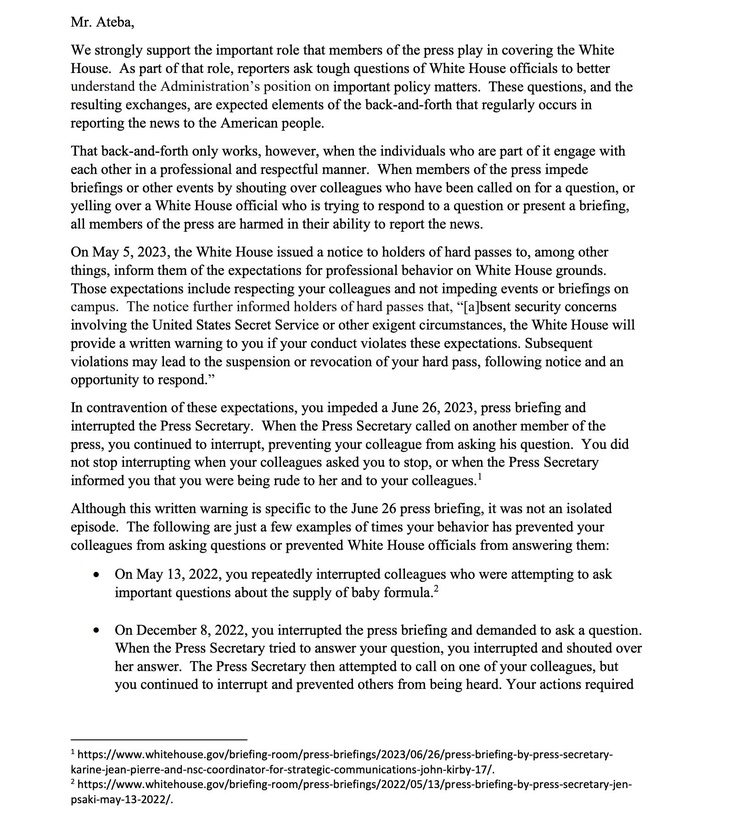
Simon Ateba just tweeted this letter he received from the White House.
Mr. Ateba,
We strongly support the important role that members of the press play in covering the White House. As part of that role, reporters ask tough questions of White House officials to better understand the Administration’s position on important policy matters. These questions, and the resulting exchanges, are expected elements of the back-and-forth that regularly occurs in reporting the news to the American people.
That back-and-forth only works, however, when the individuals who are part of it engage with each other in a professional and respectful manner. When members of the press impede briefings or other events by shouting over colleagues who have been called on for a question, or yelling over a White House official who is trying to respond to a question or present a briefing, all members of the press are harmed in their ability to report the news.
On May 5, 2023, the White House issued a notice to holders of hard passes to, among other things, inform them of the expectations for professional behavior on White House grounds. Those expectations include respecting your colleagues and not impeding events or briefings on campus. The notice further informed holders of hard passes that, “[a]bsent security concerns involving the United States Secret Service or other exigent circumstances, the White House will provide a written warning to you if your conduct violates these expectations. Subsequent violations may lead to the suspension or revocation of your hard pass, following notice and an opportunity to respond.”
In contravention of these expectations, you impeded a June 26, 2023, press briefing and interrupted the Press Secretary. When the Press Secretary called on another member of the press, you continued to interrupt, preventing your colleague from asking his question. You did not stop interrupting when your colleagues asked you to stop, or when the Press Secretary informed you that you were being rude to her and to your colleagues.
Although this written warning is specific to the June 26 press briefing, it was not an isolated episode. The following are just a few examples of times your behavior has prevented your colleagues from asking questions or prevented White House officials from answering them:
• On May 13, 2022, you repeatedly interrupted colleagues who were attempting to ask important questions about the supply of baby formula. • On December 8, 2022, you interrupted the press briefing and demanded to ask a question. When the Press Secretary tried to answer your question, you interrupted and shouted over her answer. The Press Secretary then attempted to call on one of your colleagues, but you continued to interrupt and prevented others from being heard. Your actions required the Press Secretary to end the briefing, preventing your colleagues from asking additional questions. • On March 20, 2023, you prevented the Press Secretary from introducing White House guests at a press briefing by shouting over her. Other members of the press called for “decorum” in the room. One of your colleagues apologized to the guests for the disruption before the briefing continued. Several minutes later, you again interrupted and impeded the briefing while other members of the press again asked for decorum. While you were impeding the briefing, the Press Secretary could not speak and other members of the press could not ask questions. One member of the press felt it necessary to explain how your disruptive actions had harmed all other journalists at the briefing, stating that “you are impinging on everybody in here who is only trying to do their job.” o Later that day, the White House Correspondents’ Association emailed its members, explaining that “there was an extreme breakdown of decorum in today’s Daily Briefing.” According to the Association, “[w]hat happened today created a hostile work environment for everyone in that room.” The Association explained that the breakdown caused by your outbursts “prevent[ed] a briefing from proceeding,” which “hurts the entire press corps and amounts to a violation of the collegiality called for in the WHCA’s bylaws.”
The White House recognizes that members of the press often raise their voices or shout questions at press briefings or events. Ordinarily such shouting stops when a reporter is called on for a question, and the briefing or event is able to continue. Continued interruptions are different; they prevent journalists from asking questions or administration officials and guests from responding. The Press Secretary’s only option in response to such disruptions is to stop the briefing or event, which is to the detriment of all journalists.
This letter serves as your written warning, pursuant to the May 5, 2023 Notice, that the behavior you exhibited on June 26, 2023 is unacceptable. If you continue to impede briefings or events by shouting over your colleagues who have been called on for a question, even after you have been asked to stop by a White House employee, then your hard pass may be suspended or revoked, following notice and an opportunity to respond.
We hope that you will work with us to avoid any future issues in the press briefing room or at other events on White House grounds. If you would like to comment on this letter, please reply by email within 7 days.
Fermented foods are not just good for people, they are great for animals. Fermenting chicken feed is so easy and it makes the grains far more nutritious. All you do is put your feed in a bucket and add water until the water covers the feed. Let it soak for 1 to 3 days and you should see it start bubbling. It’s fermented and ready to feed your chickens. You will probably have to add more water after your initial mixture grows in volume to make sure there is always a little bit of water covering the top. This prevents mold. Our chickens love their fermented feed and will leave any dry feed untouched if their fermented feed is in front of them.
We met Corona at 4H yesterday, she’s a one-eyed barrel racing horse. She had ocular melanoma and her eye was surgically removed last year. She has made a full recovery and is back to barrel racing! She has won over $400 in local competitions in just a few months with her young rider.
I have added Green Pasture’s fermented skate liver oil to my fish oil nutrition regimen. It is another great source of omega fatty acids along with Vitamins A & D. I was talking to a friend who said it dramatically improved her sleep which she attributes to decalcification of the pineal gland. I still take my cod liver/butter oil for my teeth especially. Worried about WWIII? Make sure you’re healthy for the zombie apocalypse!
USE PROMO CODE “ALISON” for 10% OFF:
https://www.greenpasture.org/
















